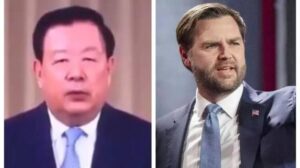“JD Vance Criticizes White House Turmoil Amid Escalating U.S.-China Trade War”…
In the wake of escalating tensions between the United States and China, political turmoil has gripped the White House, prompting prominent voices like Senator JD Vance to weigh in on the matter. The recent trade conflict has not only disrupted global markets but also exposed deep fractures within the current administration’s approach to foreign policy and economic strategy. According to Vance, the internal discord in Washington is a direct result of poor planning and reactive decision-making rather than a coherent long-term vision.
Vance emphasized that the trade war, which was intended to bolster American manufacturing and reduce reliance on Chinese imports, has instead unleashed a wave of uncertainty. Key industries across the country are grappling with supply chain disruptions, price increases, and declining investor confidence. These economic ripples have, in turn, triggered a political storm within the White House, as advisers and policymakers scramble to respond to the fallout.
In his comments, Vance did not shy away from criticizing the administration’s handling of the situation. He argued that the White House has failed to adequately communicate its strategy to the public and international partners. This lack of clarity has led to mixed messages, further weakening America’s negotiating position and creating confusion among allies and trading partners.
Moreover, Vance suggested that the current crisis reflects a broader pattern of dysfunction within the executive branch. He pointed to a leadership vacuum and internal disagreements among top officials as key reasons for the chaos. Without a unified front or a consistent policy direction, the administration appears fragmented and reactive rather than proactive.
Vance also warned that the long-term consequences of the trade war could be severe if corrective action is not taken soon. He urged the administration to adopt a more strategic, transparent, and consultative approach going forward. This includes working more closely with Congress, business leaders, and international allies to develop sustainable solutions that strengthen America’s economic standing without sparking unnecessary conflict.
Despite his critiques, Vance acknowledged the importance of confronting China on unfair trade practices and intellectual property violations. However, he stressed that such efforts must be grounded in sound policy and careful execution, rather than driven by political expediency or short-term gains.
As the dust continues to settle from the ongoing trade tensions, Vance’s remarks underscore the urgency of restoring order and direction within the White House. His comments have resonated with a growing number of lawmakers and analysts who fear that continued disarray at the top could have lasting repercussions for U.S. economic leadership and global stability.
